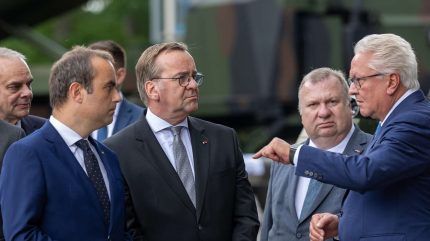Germany dispel doubt over commitment to FCAS, MGCS

The German Defence Minister Boris Pistorius maintained that European countries remain committed to several next generation defence projects, notably the Future Combat Air System (FCAS) and the Main Ground Combat System (MGCS).
During a visit from his French counterpart, Sébastian Lecornu, to Osnabrück, Pistorius’ hometown, after visiting Rheinmetall’s site in Unterlüß.
“We must move Europe forward to make it more secure,” Pistorius said, after the visit this week. This assurance comes at a time when certain projects are facing hurdles.
FCAS trouble
In particular, FCAS – in which France, Germany, and Spain work together to develop a combat aerial system-of-systems – face internal disputes among leading contractors.
During the Paris Air Show in June 2025, Jean-Brice Dumont, head of air power at Airbus Defence and Space, briefly referred to contention over leadership with the French contractor, Dassault.

“There are naturally roles for all of us in the forum”, he said, adding that Airbus will “demonstrate our leading contribution”.
FCAS and other such projects represent Franco-German cooperation and partnership. “They do not represent national egoism,” hinted a release issued by the German Ministry of Defence.
Dumont also addressed “difficulties in execution” right now, at “the beginning of the end” of Phase 1B, in developing and testing demonstrators.
“We have to accelerate… because there’s war everywhere. “We have to consider that some areas of this major programme have to deliver products earlier” to meet the 2040 deadline.
MGCS confusion
Rheinmetall, together with other German-French industrial partners, is playing an important role in the development of innovative technologies for the MGCS. The project is also scheduled to launch in 2040.
Pistorius similarly emphasised that everyone involved remains committed to the programme’s ambition. However, there is a lack of clarity, if not outright duplication, between MGCS and the more recent MARTE tank development programme.
Both projects appear to be running side by side, with both led by Rheinmetall (alongside KNDS for MARTE).
Moreover, it is unclear whether MGCS will develop a main battle tank (MBTs) or an armoured vehicle. Although, Hensoldt, a German defence supplier, has identified MGCS as a key strategic programme intended to develop a successor to the Leopard 2 and Leclerc MBTs, a gap that MARTE claims to fill.
Critically, this lack of clarity may obstruct fiscal commitments in Europe, leading to an unclear vision for the future force structure in Europe.


